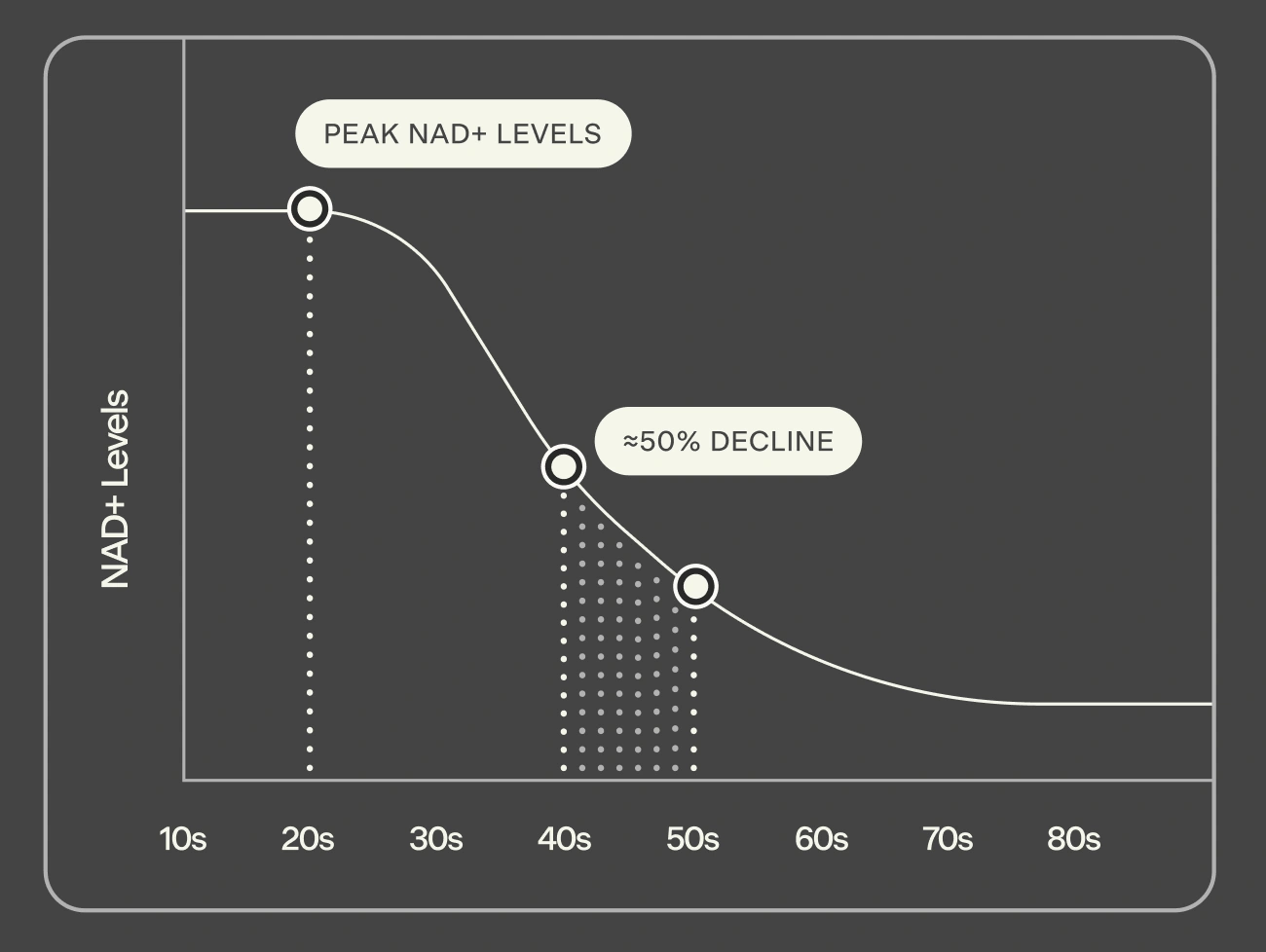Table of Contents
Feeling drained for no clear reason? It happens to many of us. You might eat fairly healthy, get some rest, and even sneak in a quick workout. Yet somehow that mid-afternoon crash still shows up.
Once you hit your 40s, your body changes in quiet ways. Hormones shift. Metabolism slows. The cells that once fired up easily start to lose some of their spark. It’s not in your head. You’re just running on a slightly different system now.
The good news is you don’t need to keep refilling the coffee mug. There are easy, natural things you can do to bring your energy back, no jitters or crashes involved.
Here’s what you’ll find below:
-
Why energy tends to dip with age
-
Seven simple ways to feel more awake and active
-
A few natural supplements that support energy at the cellular level
Why Energy Declines With Age
You know that weird feeling when you wake up ready to go, but by afternoon, your body acts like it’s done for the day? It’s not your imagination. Energy really does fade with time, and here’s why.
Mitochondrial Slowdown and NAD+ Decline

Inside every cell, there are tiny engines called mitochondria. They make ATP, that’s your body’s fuel. Over the years, those engines wear down a little. One reason is that your NAD+ levels drop. NAD+ is like the oil that keeps everything running smooth.
Less NAD+ means less power output. So your body starts cutting corners. You feel slower, workouts feel heavier, focus doesn’t hit the same. Basically, the battery doesn’t hold a full charge anymore.
Loss of Muscle Mass (Sarcopenia)
Once you hit your thirties, your body quietly starts to lose a bit of muscle every decade, about 3%-5% on average (1). This gradual decline is called sarcopenia.
Muscle does more than just move your body. It’s one of your main energy burners, helping regulate blood sugar and metabolism. So when muscle mass drops, your energy production slows down too.
That’s when you start noticing things like easier fatigue, reduced strength, and a metabolism that just doesn’t run as fast as it used to.
Decline in Heart Function
Your heart’s a muscle too, and as it gets older, it doesn’t pump quite as strong (2). That means less oxygen reaches your cells. And without oxygen, your mitochondria can’t make ATP efficiently. That’s why you might notice you’re breathing harder during a walk that used to feel easy.
It’s not just about age; it’s about how your body’s whole energy network runs a little less smoothly.
Put it all together: less muscle, slower mitochondria, reduced oxygen delivery—and your energy system takes a hit. Add in modern stress, lousy sleep, and processed food, and no wonder most people feel drained.
Here’s the good news: it’s not permanent. You can rebuild a lot of what’s lost. Regular exercise, proper sleep, stress control, and the right nutrients can help your cells work better again. It’s like giving your body a tune-up. You may not feel twenty again, but you’ll feel a whole lot more alive than you do now.
7 Natural Ways to Raise Your Energy (Without Relying on Stimulants)
1. Skip Ultra-Processed Foods
Packaged snacks and frozen meals might save time, but they quietly drain your energy. They’re full of refined oils, preservatives, and sugar that cause quick spikes and sudden crashes.
A good rule: eat food that looks like food. Meat, fish, eggs, veggies, fruits, nuts, oats, sweet potatoes, the basics. If the ingredient list looks like a chemistry class project, skip it.
2. Prioritize Sleep Regularity (Not Just Duration)
You can get eight hours of sleep and still feel like a zombie the next day. Why? Because your timing’s off. The body likes rhythm, same bedtime, same wake-up, even on weekends. When that rhythm’s broken, your hormones don’t line up right, and your energy feels scattered.
Try this for a week: wake up at roughly the same time every day and go outside for a few minutes. Morning light tells your brain, hey, it’s daytime. That small signal does more for your sleep than most people realize. Stick with it and you’ll start waking up sharper, without the groggy lag.
3. Cut Out Caffeine (Yes, Really)
I know, it’s tough. Coffee feels like life support some mornings. But here’s the thing, caffeine doesn’t give you real energy; it borrows it. It blocks adenosine, the chemical that tells your brain it’s time to chill. Once it wears off, you crash.
And it hangs around way longer than you’d expect. A cup at 10 or 11 a.m.? Still in your system by bedtime.
Try cutting it for two weeks. The first few days might drag, sure, but your natural rhythm will come back stronger. Herbal tea or even hot water with lemon helps in the meantime. You’ll notice fewer crashes and smoother focus once your body resets.
4. Exercise Regularly (Especially Strength Training)
Movement fixes almost everything. It wakes you up, clears your head, and trains your cells to use oxygen better.
Strength work deserves extra love here. You lose muscle as you age, and muscle is basically your built-in energy burner. Rebuild it, and you’ll feel the difference fast.
You don’t need a gym or fancy plan. Do push-ups, squats, or band work, whatever keeps you moving. Two or three short sessions a week are enough. Within a month, you’ll notice you breathe easier, sleep better, and have more gas in the tank.
5. Reduce Stress (and Inflammation)
Nothing drains your energy faster than constant stress. When pressure builds, your body releases cortisol, helpful in short bursts, but harmful when it never shuts off. Over time, high cortisol leads to inflammation, fatigue, and that worn-out feeling that’s hard to shake.
You can’t avoid stress completely, but you can help your body bounce back. Try these simple resets:
Meditation or breathwork: Just five minutes can calm your mind and lower stress hormones.
Move your body: Walking, stretching, or light workouts burn off tension and clear your head.
Get outside: Sunlight, fresh air, and time away from screens help reset your nervous system.
Warm baths or saunas: Both relax muscles, ease tension, and help your body unwind.
Anything that helps you relax also helps your mitochondria, and when they work better, your energy follows.
6. Eat to Nourish, Not Just to Fill Up
Food isn’t just fuel, it’s information. What you eat tells your body how to function.
Make sure you’re getting enough protein, good fats, and slow carbs. A rough guide:
Protein: 1 to 1.2 grams per pound of your goal weight
Fat: around 0.8 to 1 gram
Carbs: 0.7 to 1.2 grams
For a 150-pound target, that’s roughly 150–180g protein, 120–150g fat, and 100–180g carbs.
And don’t skip colorful fruits and veggies. They’re packed with antioxidants that protect your cells from fatigue.
7. Cut Back on Alcohol and Quit Smoking
Everyone knows smoking’s rough on health, but alcohol quietly steals your energy too. Even one or two drinks can mess with sleep, and you feel it the next day, slower, heavier, less focused.
Your liver has to process every drop, and while it’s busy doing that, your body pauses other repair work. Take a few weeks off and you’ll notice the difference fast. Deeper sleep, sharper mornings, less dragging yourself through the day. It’s worth it.
Supplements That Help You Rebuild Energy
Even with solid habits, your cells might still need a little help. As we age, our bodies naturally slow down energy production, especially when NAD+ levels drop.
NAD+ is a coenzyme that helps turn food into energy. By your fifties, your levels can be half of what they were in your twenties. That’s a big reason for lower stamina and slower recovery.
At OMRE, we like to focus on nutrients that help your body rebuild that natural energy process from within. Here are two that stand out:
1. NAD+ Booster (NMN + Resveratrol)
These two compounds work best together to boost your body’s natural NAD+ production, the molecule that keeps your cells’ mitochondria running and powers energy metabolism.
NMN (nicotinamide mononucleotide) helps refill declining NAD+ levels, allowing your body to turn food into usable energy more efficiently.
Resveratrol activates sirtuins, the proteins that keep mitochondria healthy and help repair cell damage so your cells function in a more youthful, balanced way.
When combined, they support steady daily energy, quicker recovery after workouts, sharper focus, and an overall sense of vitality.
2. Spermidine for Cellular Renewal
Spermidine helps trigger autophagy, which is your body’s built-in cleanup system. It’s how old or damaged cells get broken down and replaced by new, healthy ones. As you age, that process slows down, and your cells start to collect “junk” that makes you feel sluggish.
By reactivating autophagy, Spermidine helps clear that clutter so your cells can run more efficiently. People often notice steadier energy, better focus, and even brighter moods. It’s one of the most researched compounds in longevity science today.
Bottom Line
You don’t need to chase caffeine or energy drinks to feel alive again. Energy after forty is all about supporting your body, not forcing it.
Eat real food. Move more. Sleep with intention. Manage stress and feed your cells what they need. Once you do that, the fog starts to lift. You’ll feel steady, clear, and more yourself again, maybe even better than before.



